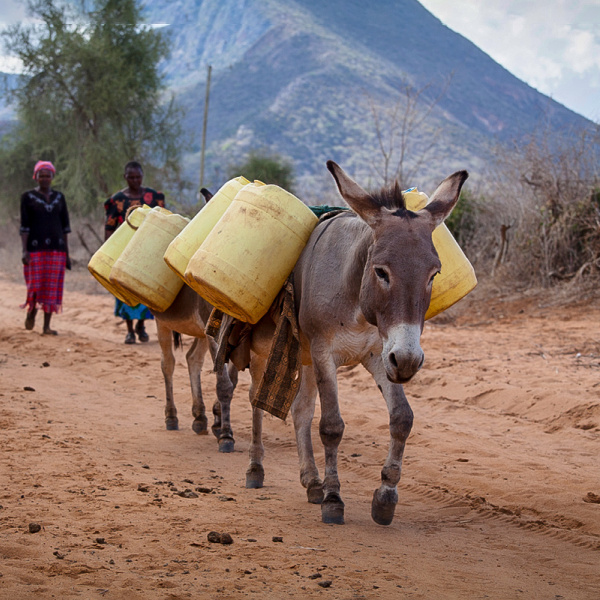During the COP26 climate change conference in Glasgow, The Donkey Sanctuary was formally admitted to the UN Framework Convention on Climate Change (UNFCCC), the international body that oversees intergovernmental actions and meetings about global warming.
Accreditation indicates a recognition that working equids should have a voice in future negotiations about climate change and allows the charity to formally participate in future Conference of the Parties (COP) meetings and other UNFCCC events.
The charity sent a team to Glasgow with a pledge to speak up for over 40 million working donkeys, which are crucial for supporting sustainable communities and helping them recover from climate events.
Ian Cawsey, Director of Advocacy & Campaigns at The Donkey Sanctuary, said: “This was our first engagement at a COP event and it was a great start to have our UNFCCC accreditation approved.
“Working equids often play a crucial role in emergency response to climate disasters and can be key to the speed of recovery by delivering aid and reconstruction materials. Our accreditation will help us to further influence the thinking of key decision makers in the rooms where future climate action will be discussed.”
The Donkey Sanctuary worked alongside one of its partners, World Horse Welfare to explain how donkeys, horses and mules need to be part of future planning to cope with global warming.
Debbie Warboys, International Programme Officer at World Horse Welfare said: “Working equids are a vital and often overlooked part of life for people and communities around the world and their role in climate change resilience and adaptation is also often ignored.
“It has been wonderful to work at COP26 alongside The Donkey Sanctuary to raise awareness of the key role working equids play in providing sustainability in many areas and ensure that they are not forgotten when developing policies that seek to build a more sustainable world."
The Donkey Sanctuary team spoke and participated at a programme of events during the conference, which ran from 31 October to 12 November 2021. They also met with targeted government stakeholders from around the world and key UN departments, like the International Fund for Agricultural Development.
Ian said: “COP26 was a huge event and we had both a small team and a niche point to make. But we were heard and we look forward to building on the connections we made and strengthening the awareness to give donkey, mules and other working animals the respect and protection they deserve”.
An estimated 500 million people in the world’s most vulnerable communities rely on working equines as a lifeline to support their livelihoods in sectors such as agriculture, industry and transportation.
For women in particular, owning a donkey or having access to one, improves their social status freeing them from domestic tasks such as collecting water from long distances. In turn, this helps women to engage in other income-generating activities and ensure their children go to school.
The Donkey Sanctuary is a global leader for equine welfare, research and veterinary care. The charity operates programmes worldwide for animals working in agriculture, industry and transportation.
For interviews, images and information please contact The Donkey Sanctuary press office on 01395 573124 or 07870 849563 (including out of hours) or send an email.
The Donkey Sanctuary is the world's largest equine welfare charity. Our vision is a world where donkeys and mules live free from suffering and their contribution to humanity is fully valued. We run 10 sanctuaries around the UK and Europe, giving lifelong care to more than 7,000 donkeys and mules. Our hospital treats sick donkeys and trains vets both nationwide and worldwide. Our donkey-facilitated learning programme helps vulnerable children and adults develop life skills by connecting with donkeys on an emotional and physical level. The charity operates programmes worldwide for animals working in agriculture, industry and transportation, and those used in the production of meat and skin.
Please note that the name ‘The Donkey Sanctuary’ should not be abbreviated to ‘Donkey Sanctuary’, and the word ‘The’ should always appear with a capital ‘T’ as above.
